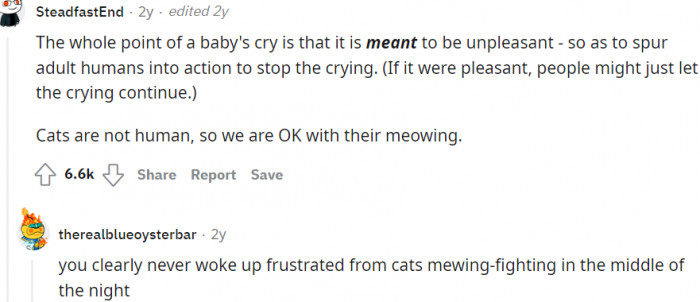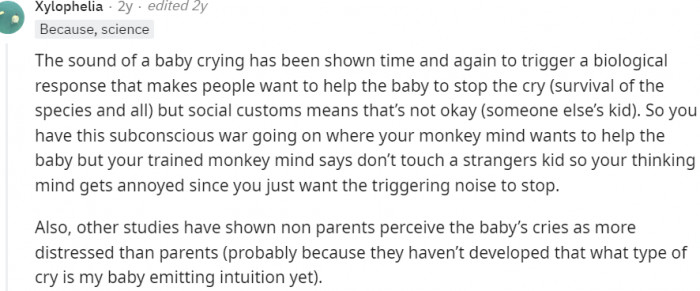Redditors Discuss Why A Random Baby’s Cry Sounds Annoying But A Random Cat’s Cry Sounds Pleasing
Every day, babies typically spend 2 to 3 hours crying. There are various reasons that can make newborns cry.
For instance, a baby will cry when they are disturbed, uncomfortable, hungry, or even want to be held. Sometimes, a newborn will cry for reasons that aren’t obvious, as babies are born into the world with different temperaments.
Some are easygoing, some are relaxed, and others appear to be more intense. Have you ever been on public transport or an airplane with a crying baby?
It can be nerve-wracking and annoying, but at the same time, it can also stir something in you to tend to the child or offer some guidance on how to stop the child from crying. The former is the case in today’s Reddit question.
The Redditor is asking why he feels annoyed when he hears a random baby crying but enjoys it when a random cat meows in the street, and he can even meow back. But then, have you ever thought about why the cry of babies is so annoying to you in the first place?
Well, researchers have discovered that our brains are wired to react strongly to the sound of babies, making us more attentive and preparing our bodies to help whenever we hear it, regardless of whether we're the child's parents or not. Individuals have their own various reasons, so how about we take a look at what other Redditors had to say?
And the question pops up:

The Reddit community shares their unfiltered responses to the above question. Let's have a look, shall we?
The whole point of a baby's cry...

Baby's cries trigger a biological response

The Psychology of Sound Perception
The contrast in emotional responses to baby cries versus cat meows can be understood through the lens of sound perception and evolutionary psychology. Research suggests that humans are hardwired to respond to the sound of a baby's cry due to its association with survival and caregiving. A study published in the Journal of Evolutionary Psychology found that the brain's reward centers activate more strongly when hearing a baby cry compared to other sounds, indicating a deeply ingrained response.
On the other hand, cat vocalizations often evoke feelings of calm and affection, which can be attributed to their role as companions. This difference in emotional response highlights the unique relationship humans have with different species.
The Psychology of Sound Perception
The difference in our reactions to a baby's cry versus a cat's meow can be explained through psychological theories of sound perception and emotional response.
Research published in the Journal of Experimental Psychology indicates that human brains are wired to respond urgently to the sounds of infants, as these sounds are intrinsically linked to survival and caregiving.
Conversely, a cat's meow is often perceived as a pleasant sound, which can evoke affection rather than urgency.
Crying back to a baby works sometimes...

A positive noise versus the rest

Lol...
A candid piece of advice to the OP from a concerned Redditor.

From a psychological perspective, the differing perceptions of these sounds can be linked to conditioning and reinforcement. Research shows that positive reinforcement in the form of affection or treats can enhance a cat's vocalization in ways that are pleasing to their owners. In contrast, the distress associated with a baby's cry is often linked to an immediate need for action, triggering a different emotional response.
Understanding these differences can help pet owners appreciate their cats' communication styles while also fostering a deeper bond through positive reinforcement techniques.
Interestingly, a study from Yale University found that the frequency range of a cat's purr can trigger a calming response in humans, further explaining the allure of this sound.
These findings suggest that our emotional responses to different animal sounds are not only instinctual but also shaped by our experiences and societal conditioning.
We are all smart predators

Here's a straight answer

And there is a name for it...

Behavioral Conditioning in Pets
The phenomenon of cats responding positively to their owner's calls or sounds can be attributed to behavioral conditioning. According to B.F. Skinner's principles of operant conditioning, behaviors that are reinforced are more likely to occur. Research from the Journal of Animal Behavior demonstrates that cats who receive positive reinforcement for responding to certain sounds will continue to respond positively in the future.
This means that when cat owners use specific sounds or phrases, such as 'pspspspsps,' and consistently reward their cats, they can condition their pets to respond more readily, creating a delightful interaction.
The Social Influence of Animal Sounds
Our perceptions of animal sounds can also be influenced by social and cultural factors.
For instance, in many cultures, cats are seen as symbols of comfort and companionship, which may enhance our positive reception of their vocalizations.
Social psychologists argue that our emotional associations with these sounds play a significant role in how we respond to them.
This is supported by research that highlights the importance of context in shaping emotional responses.
Baby cries are hard to ignore

Someone agrees with the OP

Here's another angle...

Moreover, the concept of 'neural coupling'—the brain's ability to synchronize with the sounds and expressions of others—plays a significant role in how pets and owners relate to one another. Research suggests that when a cat hears familiar sounds or voices, it may create positive associations that enhance their emotional bond. This neural synchronization can lead to increased trust and responsiveness, making interactions more enjoyable for both the cat and the owner.
To leverage this, owners can create a unique sound that their cat associates with positive experiences, reinforcing this bond through consistent interaction.
Additionally, the context in which we hear these sounds matters greatly.
A baby's cry often signifies distress, triggering a protective response, whereas a cat's meow typically indicates a desire for attention or companionship, leading to a more relaxed emotional state.
This dynamic illustrates the broader psychological principle that context shapes perception and reaction.
Cats are better than humans?

It all depends on the scenario

Someone prefers the cat meow to a baby's cry...

Understanding Emotional Responses
To better understand our emotional reactions to animal sounds, experts recommend exploring the roots of these feelings.
Reflecting on personal experiences with animals and childhood can help illuminate why certain sounds evoke specific emotions.
This self-awareness can foster a deeper appreciation for the complexity of our relationships with animals.
That'll be terrifying...

Babies cries everywhere...
You'll know the true meaning of these "high-pitched screams" when you hear a baby cry in a serene and quiet place...

Babies can't process emotions

Ultimately, fostering a positive emotional connection with animals can enhance overall well-being.
As research indicates, nurturing these relationships can lead to increased happiness and reduced stress.
Being aware of our emotional responses can also guide us in creating environments that support these connections.
The reason why is being explained
The "form most of our opinions by what others around us think" really hits hard.

Lol...
"I hear a cat meow, and I meow back."

A biological wiring...

It's ingrained in the DNA...

There's a difference
When a cat meows, it's talking to you, but a baby's cries are an alarm.

wow! wow!! wow!!!
This is pretty intense...

Taking care of a baby is a difficult task because their cries can drive you insane, especially when they cry at night. But then, they’re only babies, and we need to attend to them 24 hours a day, 7 days a week.
If you didn’t know why the cries of babies annoyed you, now you do. And if your reason differs, let us know by dropping a comment below.
Psychological Analysis
The emotional dynamics at play when we hear different animal sounds reveal much about our psychological makeup. Our responses to these sounds are shaped by both instinct and learned behaviors, underscoring the importance of understanding the context behind our reactions.
By reflecting on these dynamics, we can deepen our emotional connections with our pets.
Analysis generated by AI
Analysis & Alternative Approaches
In summary, our reactions to the sounds of different animals are deeply rooted in psychological and social factors.
Understanding these responses can enrich our relationships with pets and contribute to our emotional well-being.
Moreover, recognizing the cultural context of these sounds can enhance our empathy towards animals.
Analysis & Alternative Approaches
Ultimately, the way we perceive and react to the sounds made by cats versus babies underscores the complex interplay of evolutionary psychology and behavioral conditioning. Recognizing these dynamics can enhance our relationships with our pets and improve our interactions.
By using positive reinforcement and understanding the nuances of sound perception, owners can foster a deeper connection with their cats, enriching the human-animal bond.



